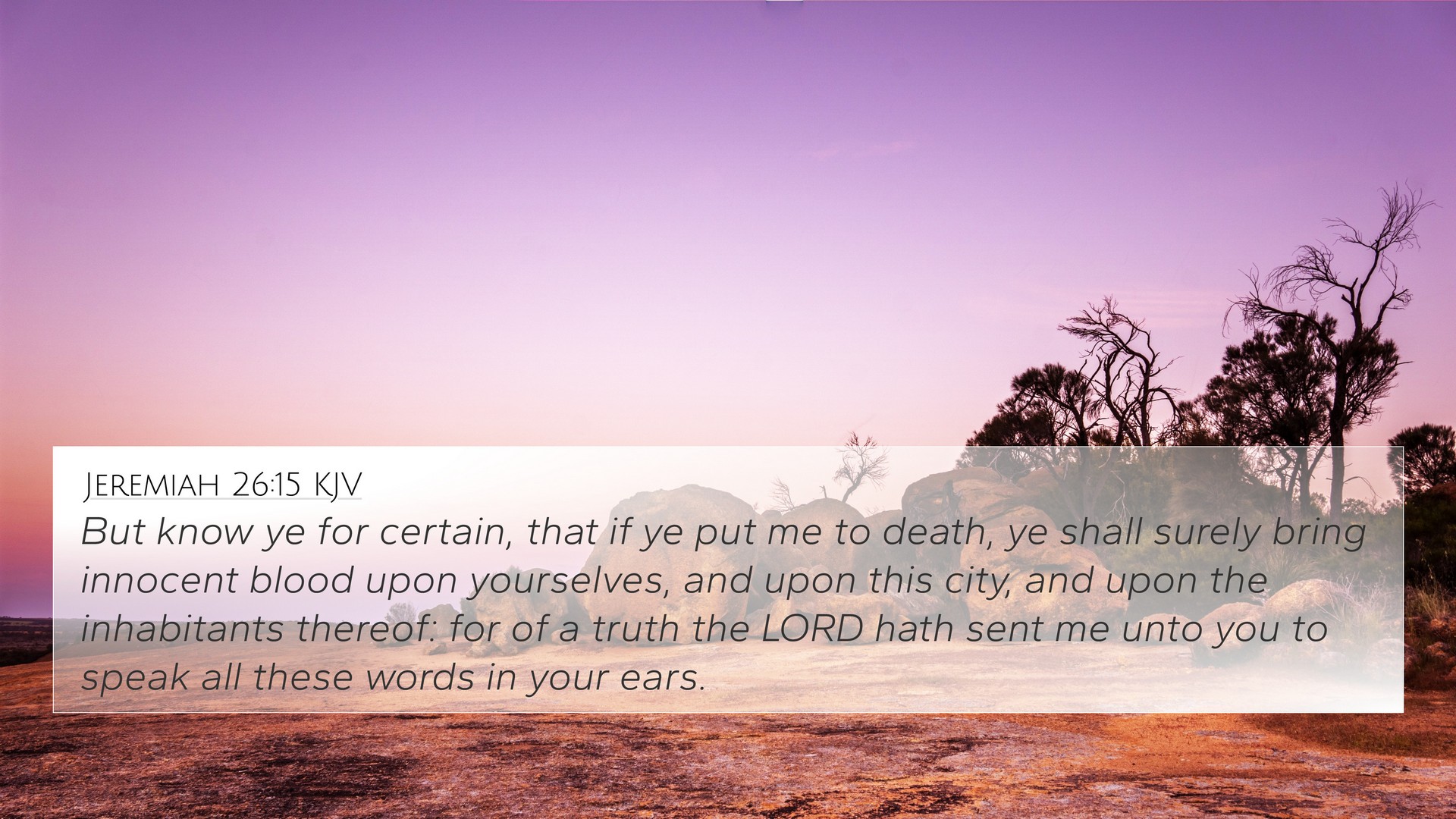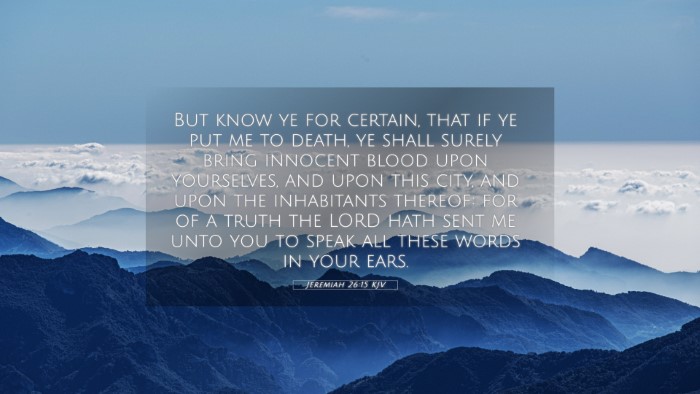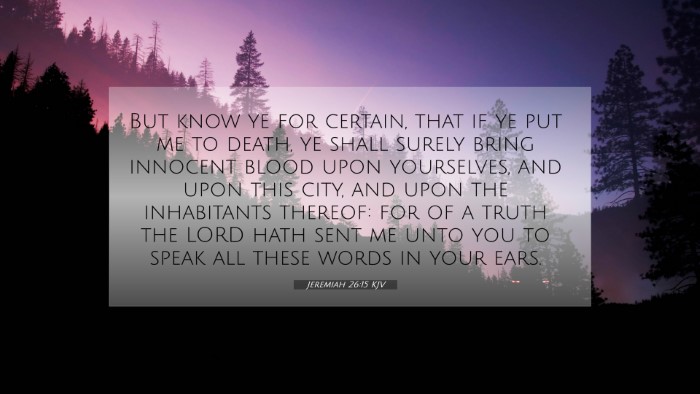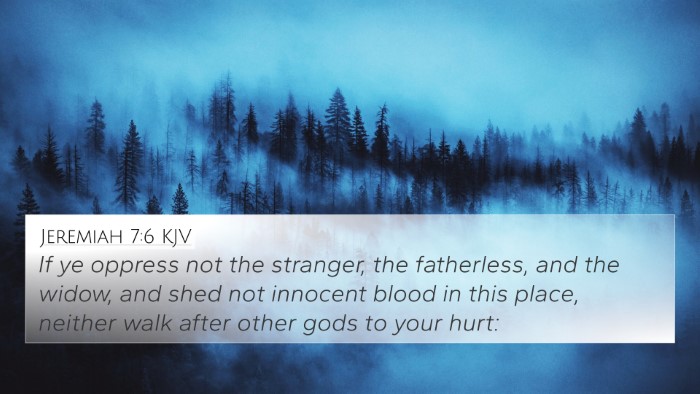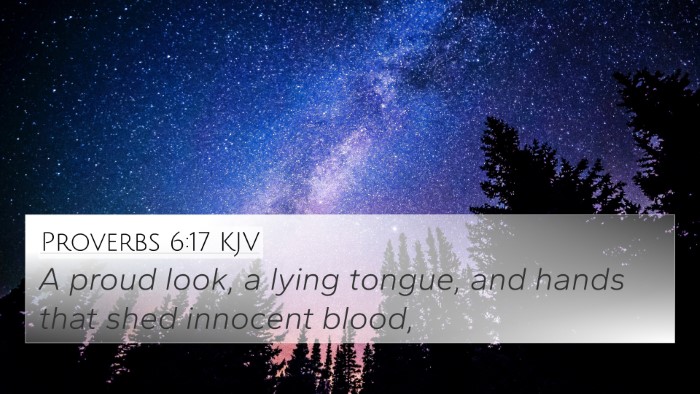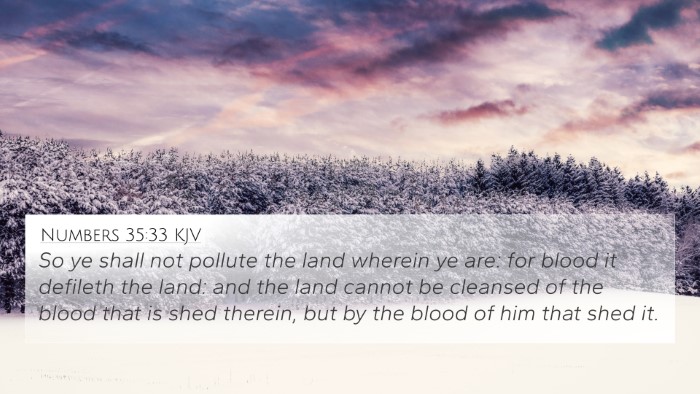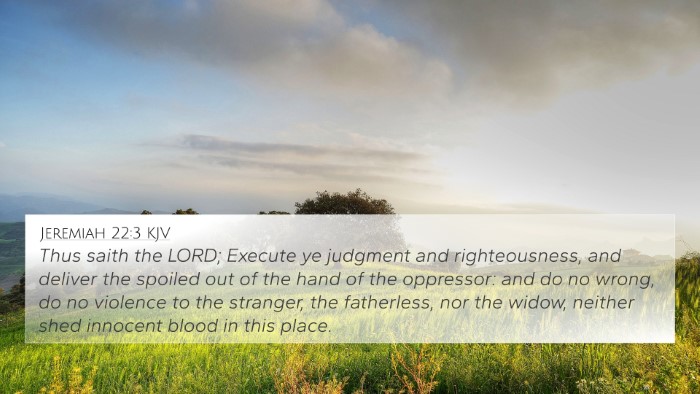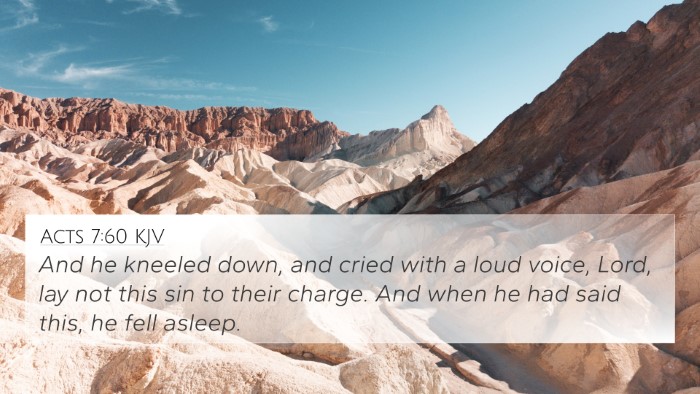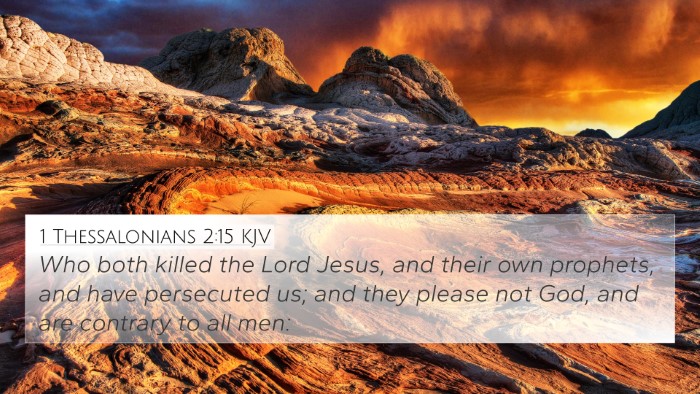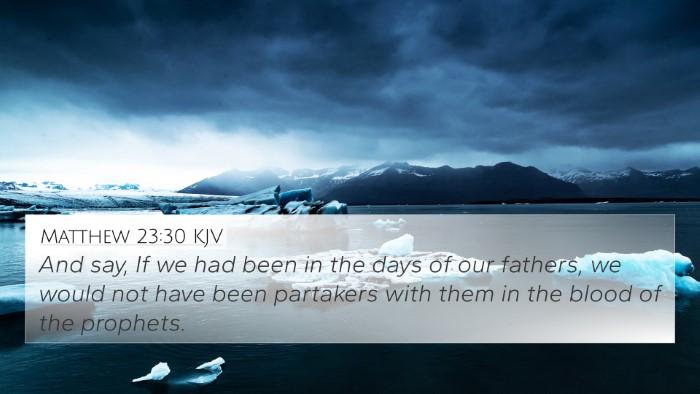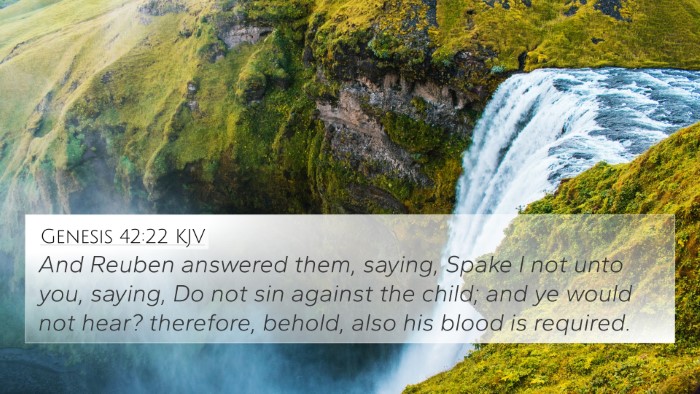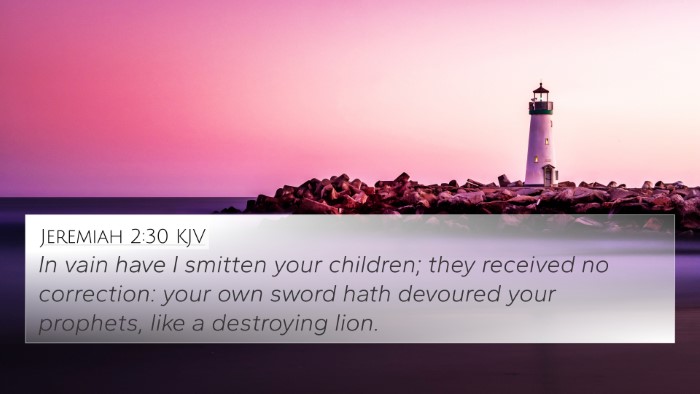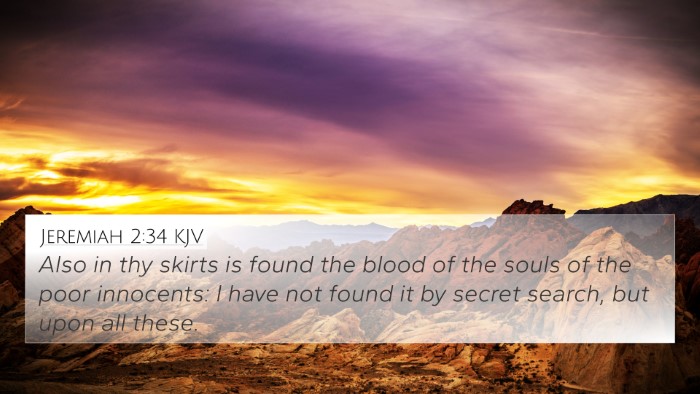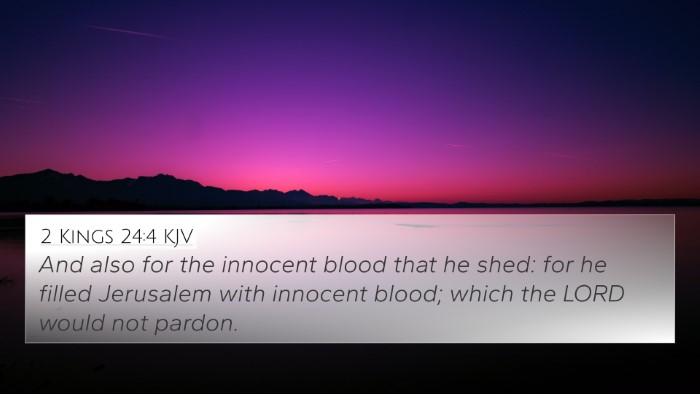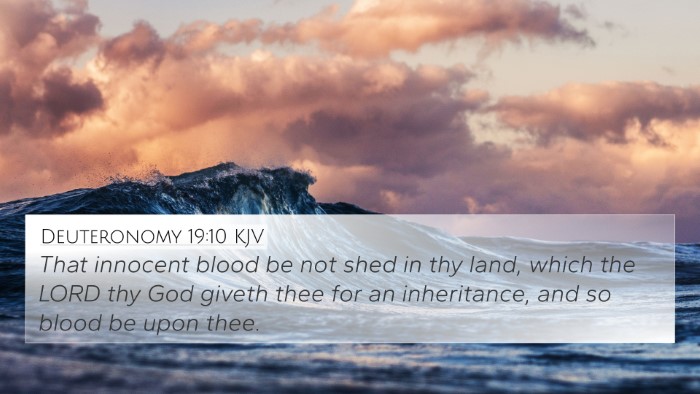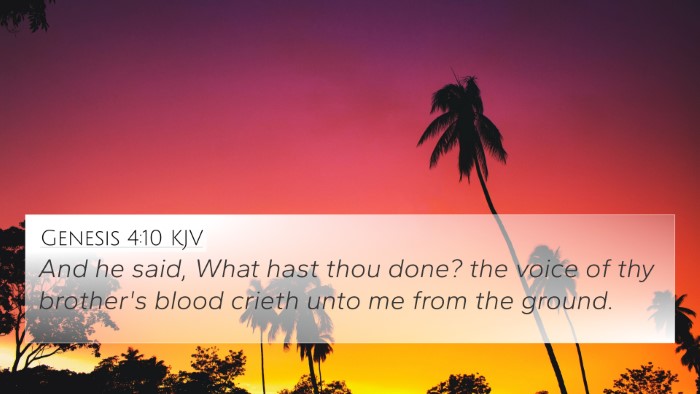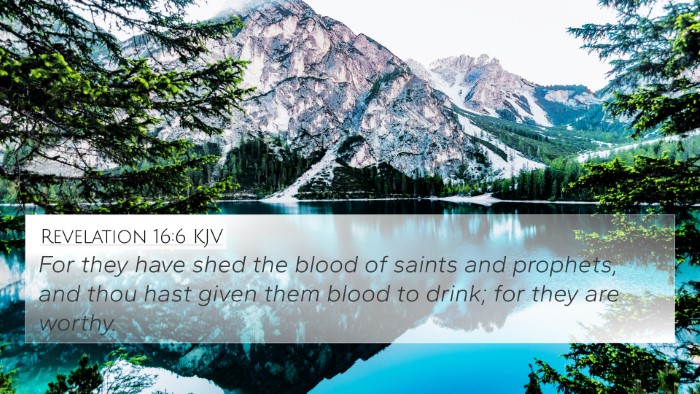Understanding Jeremiah 26:15
Bible Verse: "But know for certain that if you put me to death, you will bring innocent blood upon yourselves and upon this city and its inhabitants; for in truth the Lord has sent me to you to speak all these words in your hearing." (Jeremiah 26:15, ESV)
Context and Overview
This verse is part of a larger narrative where the prophet Jeremiah is addressing the people of Jerusalem and their leaders. He proclaims God's message, warning them of the consequences of their actions and the gravity of the prophetic words he has shared. The context highlights the tension between prophetic authority and the response of the people, who are often resistant to such divine warnings.
Commentary Insights
Matthew Henry's Commentary
Matthew Henry emphasizes the seriousness of God's message conveyed through Jeremiah. He notes that Jeremiah speaks boldly, recognizing that the rejection of God's words carries dire consequences. The concept of "innocent blood" refers to the moral and spiritual implications of disregarding prophetic counsel and willfully silencing the messenger of God.
Albert Barnes' Notes on the Bible
Barnes highlights the phrase "innocent blood" as it pertains to the responsibility of the leaders and people of Jerusalem. He interprets this as a warning that shedding Jeremiah's blood would be tantamount to rejecting God's truth. Barnes connects this theme with the overarching Biblical teachings on justice and the sanctity of life, pointing out that it is a grave sin to harm an innocent person, particularly as God’s messenger.
Adam Clarke's Commentary
Clarke provides a detailed look at the repercussions of putting Jeremiah to death. He points out that the act would not only result in personal guilt for those involved but also bring calamity upon the nation. Clarke emphasizes that Jeremiah's prophetic role is integral to the community’s spiritual welfare, reinforcing the responsibility of leaders to heed God's warnings and care for the souls entrusted to them.
Thematic Connections
This verse can be linked to several underlying themes found throughout the Bible, such as:
- The Consequences of Rejecting Prophecy: Similar to Jeremiah 26:15, other verses highlight the dangers in refusing messages from God (e.g., Proverbs 29:1).
- Blood Guilt: References to the shedding of innocent blood can be found in Genesis 4:10 and Ezekiel 33:6.
- The Role of the Prophet: Jeremiah's experiences parallel those of other prophets, such as Elijah in 1 Kings 18 and Isaiah in Isaiah 6:9-10.
- Judgment of Nations: The occurrence of prophetic judgment resonates with passages such as Isaiah 34:2 and Habakkuk 2:12.
- Divine Call and Message: Like Jeremiah, prophets like Moses (Exodus 3:10) and Jonah (Jonah 1:2) were called by God to deliver crucial messages.
Cross-Referencing Related Verses
Jeremiah 26:15 has multiple connections with other scriptures that can be valuable for deeper studies:
- Matthew 23:37: This verse shows Jesus lamenting over Jerusalem, paralleling Jeremiah's warnings.
- Luke 13:34: Similar themes of rejecting prophets.
- 1 Peter 3:17: Discusses the righteousness of suffering for doing good, akin to Jeremiah's plight.
- Acts 7:52: Relates to the historical pattern of stoning prophets and rejecting God's messages.
- Hebrews 10:26: Warns against willful sin after receiving the truth, echoing Jeremiah's warnings.
- Proverbs 1:24-26: Highlights the refusal to listen to wisdom, resulting in calamity.
- Revelation 16:6: Discusses the consequence of shedding innocent blood.
- Ezekiel 18:30: Emphasizes the need for repentance to avert judgment.
- Isaiah 1:18: God's call to reason and repentance similarly parallels Jeremiah's message.
- Matthew 5:12: Blessed are those who suffer for righteousness' sake, resonating with Jeremiah's circumstances.
Conclusion
Jeremiah 26:15 serves as a poignant reminder of the weighty role of a prophet and the serious consequences of rejecting God’s message. The interconnections with other verses enhance our understanding of Biblical themes related to prophecy, justice, and communal responsibility. By exploring these cross-references, one gains a deeper appreciation of the overarching narrative of scripture and the call to heed divine warnings.
Tools for Further Study
For anyone seeking to delve deeper into Biblical cross-referencing, there are several tools and methods available:
- Bible Concordance: A useful resource for finding verses and their connections.
- Bible Cross-Reference Guide: Offers structured ways to see relationships between passages.
- Cross-Reference Bible Study: Methodologies that enhance understanding through thematic studies.
Utilizing such tools can enhance one’s study of scripture, uncovering the rich tapestry of truths contained within the Bible.
